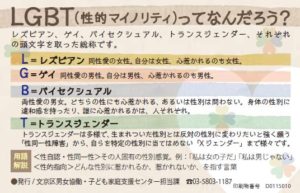On April 5th, Bunkyo Ward, Tokyo established the guidelines for school teachers and the city officials on how to deal with LGBTs to stop discrimination and harassment. It is such a rare case for a local municipality to establish the specific guidelines for dealing with LGBTs, according to Japan Alliance for LGBT Legislation(J-ALL)
I will introduce some of what is written in the guidelines. The guidelines start from explaining the basic knowledge of LGBTs, sexual orientation, and gender identity.
Chapter 2 : Dealing with residents.
“When it comes to sexual orientation and gender identity, necessary care varies from individual to individual. Therefore, communication with residents is the key to finding out what care needs to be taken when dealing with residents. A different approach needs to be taken considering his or her sexual orientation and gender identity. Respecting individual difference is highly important in terms of gender equality and human rights. When a resident comes to your office, or calls, please avoid to talk about the sex of the person loudly, or please ask the person to point out if needed so that no one else can hear the conversation. Delete all the unnecessary sex-identification blanks on documents. Respect the person’s gender identity when the person uses the bathroom. “
This chapter also explains the importance of respecting people’s sexual orientation and gender identity in case of natural disaster.
Chapter 3: School environment.
“Children have been taught the importance of human rights and the prevention of bullying, but they are not necessarily familiar with the notion of sexual orientation and gender identity. Therefore, school teachers must be aware that some of their students might have issues on their sexual orientation and gender identity. Since those children are in the period of puberty, they might suffer from low self-esteem because of their own sexual orientation and gender identity. Schools need to deepen understanding of LGBTs among teachers and students. This kind of care must be taken as a way to respect individual diversity, not as special care that divides them from other students. All the institutions, including schools, public libraries, kindergartens, and so on must make sure that all the staff are aware of the importance of respecting sexual orientation and gender identity.”
Chapter 3 also explains the importance of displaying a strict attitude toward bullying based on sexual orientation and gender identity and providing consultations and sufficient information on sexual orientation and gender identity, adding that teachers need to take seminars for better understanding of LGBTs and for respecting privacy inside and outside of classrooms. The chapter also asks teachers not to prohibit students with gender dysphoria from wearing a school uniform of their choice, joining a club of their choice, and using their common name at school.
Chapter 4 bans people from discriminating others based on sexual orientation and gender identity. It also explains the importance of avoiding outing someone’s sexuality without consent.
Bunkyo Ward has shown its political stance of banning discrimination based on sexual orientation and gender identity since the enactment of “Gender Equality Promotion Act” in 2013. It says “no one deserves to be the victim of human rights violations such as sexual harassment, domestic violence, and discrimination based on sexual orientation and gender identity.”
Since then, Bunkyo Ward has distributed leaflets on LGBTs to raise awareness among city officials. However, the residents did not know how to deal with LGBTs and their issues. That pushed Bunkyo Ward into making the guidelines that specifically explain how to deal with them. The ward held seminars, collected public comments, and finally the guidelines were made with the help of Japan Alliance for LGBT Legislation (J-ALL). They will be distributed to elementary schools and junior high schools in the ward.
At first, there were many people doubting that such guidelines could work to ban LGBT discrimination, but from the viewpoint of those LGBT children who are worried about getting discriminated against and bullied at school, at least they can convince people that discrimination is wrong and they deserve to be treated equally.
“The guidelines are made for every one of us including LGBT people. They will be distributed to the entire ward. I hope they help,” said Kaori Seo, the manager in charge of diversity promotion in Bunkyo Ward.
Shigenori Nakagawa, a lawyer and an expert in LGBT issues, said the guidelines were a good approach and teachers and city officials should read them and take action.
For your information, Japan Alliance for LGBT Legislation (J-ALL) conducted a research on municipal measures on difficulties resulted from sexual orientation and gender identity and published a survey report.
According to the report, Tokyo is the first prefecture that took early initiatives in including freedom of sexual orientation and gender identity in its basic policy for human rights( a lot of public comments were sent regarding this policy.) However, there are only three municipalities in Tokyo, Koganei City, Bunkyo Ward, and Tama City, that stipulate the importance of respecting sexual orientation and gender identity in their basic policy for human rights. In that sense, the guidelines set by Bunkyo Ward are very progressive.
For your information again, Setagaya Ward, Tokyo is now in the process of making guidelines for banning discrimination based on sexual orientation and gender identity.
4/10/2017

 Bunkyo ward issued and handed out this card for residents’ education.
Bunkyo ward issued and handed out this card for residents’ education.